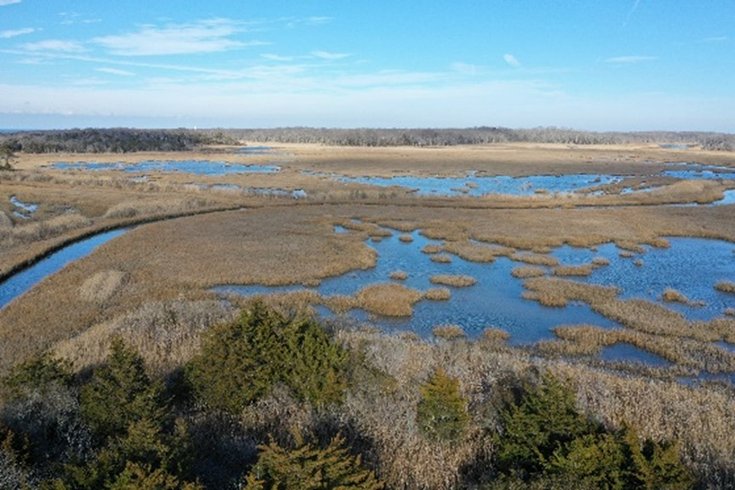
February 05, 2024
 Source/NJDEP
Source/NJDEP
Acres of the Higbee Beach Wildlife Management Area in Cape May County are closed to the public for an ecological restoration project.
The New Jersey Department of Environmental Protection has closed a portion of Cape May County's Higbee Beach Wildlife Protection Area in advance of a $37.5 million ecological restoration project that begins later this month, officials said.
The 1,160-acre nature preserve is along the Delaware Bay at the southern tip of New Jersey in Lower Township. The upcoming project, which will improve wildlife habitats and tidal flow to marshes, is expected to keep a 428-acre section of the protected beach closed until December 2026. The boundaries of the project were closed to the public on Jan. 29.
“Once completed, the site will have a new trail network and multiple wildlife viewing platforms integrated into enhanced stopover habitat for migrating species," said David Golen, NJDEP's assistant commissioner of fish & wildlife "It will surely be one of New Jersey’s best wildlife viewing destinations.”
The preserve's 1-1/2 miles of shoreline have long attracted visitors from bird watchers and dog walkers to nudists, who once enjoyed free rein on the beaches. In 1999, a Lower Township police officer cited a topless woman for indecent exposure at Higbee Beach, sparking a legal battle that resulted in state courts deciding local townships could enforce their public nudity ordinances on state-run land.
Compared to other Jersey Shore destinations, the preserve's bay-facing, unguarded beaches are relatively quiet during the summer months. Parts of Higbee Beach unofficially remain popular among nude sunbathers despite the court ruling.
There's also spooky lore attached to Higbee Beach, which previously had been farmland in the 19th century. A tavern that once stood on the farm was later turned into The Hermitage hotel, owned by Joseph Smith Higbee and his brother Thomas. The pair operated the hotel for Delaware Bay pilots and lived in a nearby house for decades.
When Thomas Higbee died in 1879, he wrote in his will that he wanted to be buried near the hotel. His remains were at that site for years until his niece, who had inherited the land, left instructions in her will to disinter him and move him to the Cold Springs Presbyterian Cemetery where she also had a plot waiting for her. The hotel was torn down in 1940.
Over the years, some Higbee Beach visitors have reported seeing ghosts of the Higbee brothers treading in the area of the former hotel, sometimes accompanied by a dog. In the 1988 book "Cape May Ghost Stories," one woman recounted how she saw a glowing figure on the beach and heard a faint "whispering or giggling sound," The Courier-Post reported. The woman said she saw the figure glide over a nearby hill, and when she approached the place it had been standing, there were no footprints. The figure eventually disappeared into the water off the coast, the woman said.
New Jersey paranormalist Craig McManus wrote about Higbee Beach's haunted history for the CapeMay.com blog in 2011.
"This part of Cape May is rich in old history. It is the first part of the peninsula to be settled and has layers of history," McManus wrote. "Even though most of that history has now been forgotten by the general public, it has left its mark on a paranormal level and that energy is deeply embedded in the area. While most tourists may never have an experience, those with intuitive or psychic abilities probably will. Layers of history can hide layers of ghosts."
Restoring the wetlands of the Higbee Beach Wildlife Management Area will ensure longterm habitats for a range of migratory birds, fish, amphibians, reptiles and mammals, NJDEP officials said. An earthen berm is planned around much of the marsh's perimeter to allow for the creation of trail system and observation points. Other habitats in the wildlife area include dunes, forest, scrub and successional fields.
The closed portion of the wildlife area includes a stretch of Sunset Beach that often draws attention for its century-old train tracks, which sometimes get unearthed by storms. The abandoned "ghost tracks" originally served a mining operation and later were used to transport munitions for testing during World War I.
Other areas of the nature preserve that are now closed include Davey's Lake, most of the Pond Creek marsh and the former Harbison-Walker Magnesite Facility and landfill. Part of the Magnesite property will be reserved to construct a future education center for visitors.
The project will be paid for using Natural Resource Damage funds and will be carried out by Philadelphia-based A.P. Construction.
NJDEP will hold a meeting for public education and comment on the project on Thursday, Feb. 8 at 5:30 p.m. at the Lower Township Municipal Building.